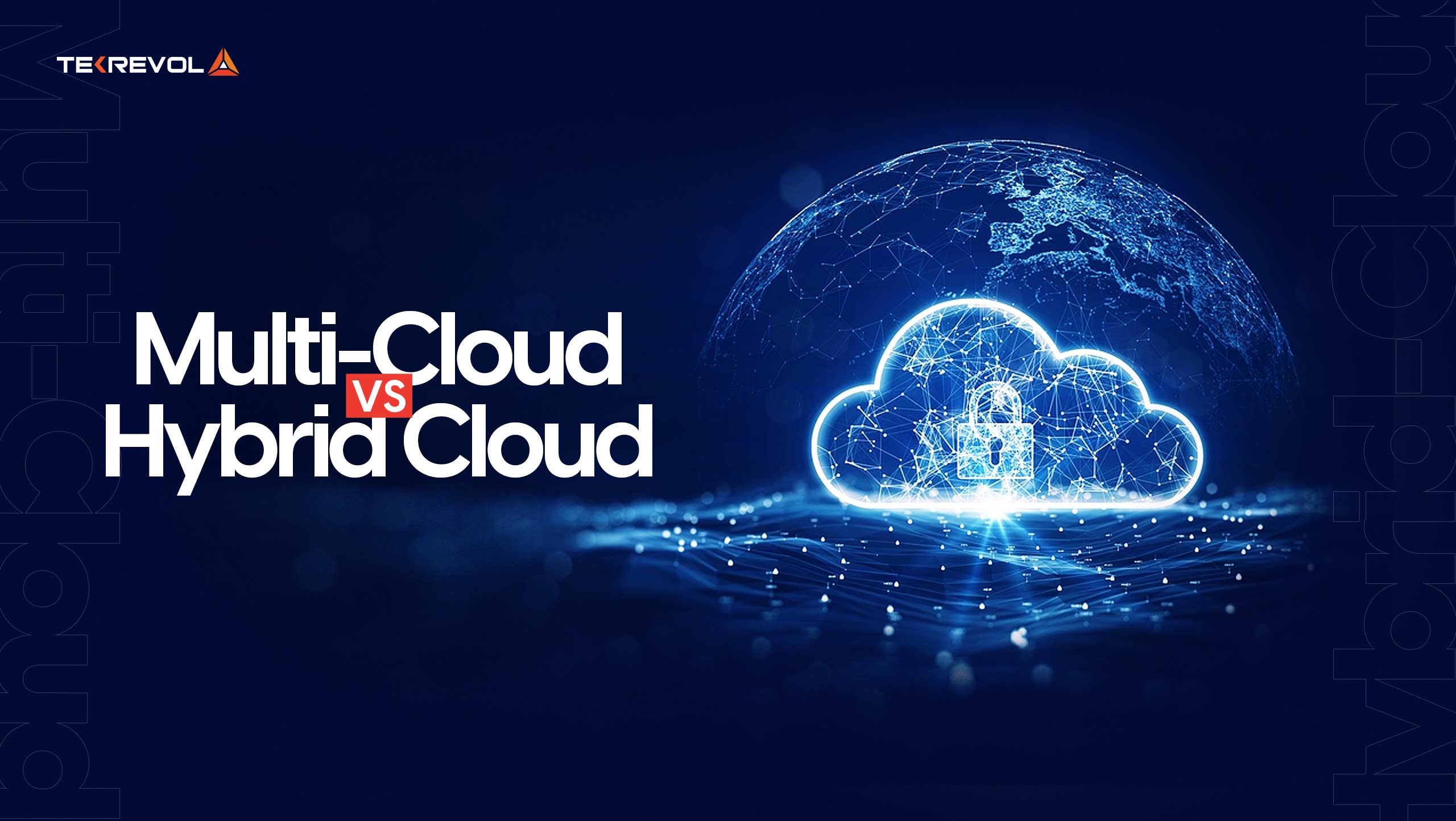In the race to gain an edge with automated, agile, and scalable digital infrastructure, organizations are increasingly focused on cloud computing solutions. And why not? These solutions offer cost benefits, flexibility, and security—essential capabilities to overcome modern challenges, whether in internal operations or customer-facing services.
Multi-cloud and hybrid cloud are the most prominent environments for cloud deployment. Both modes involve more than one cloud but differ in the types of infrastructure they include.
With certain benefits, both solutions address different business cloud needs. In this multi-cloud vs hybrid cloud guide, we’ll compare both cloud deployment options and evaluate each cloud computing solution based on various factors to find the best business fit.
Let’s begin with the basics…
What is Cloud Computing & How it Works?
Cloud computing services transform how businesses manage their IT infrastructure. Instead of relying on bulky, expensive on-site servers, cloud computing hosts applications and data in remote data centers. These services are accessible over the internet with seamless access to computing power, storage, and networking resources on-demand.
The core of cloud computing lies in its ability to offer flexible expansion—a critical factor for modern enterprises. With cloud consultancy services, companies can easily scale their resources up or down based on current demands without over-provisioning and overspending. This dynamic nature of the cloud ensures that businesses only pay for the resources they actually use, optimizing both performance and budget.
Public Cloud & Private Cloud: Key Infrastructure Models
In cloud computing, public and private clouds are key models. Public clouds are managed by third-party providers, offering scalable services over the internet, ideal for businesses needing flexibility without managing hardware. These clouds enable resource sharing while maintaining data security.
Private clouds provide a dedicated, isolated environment for a single organization, ensuring higher control and security. Hosted either on-premises or by a third party, they are crucial for businesses with strict compliance and data protection needs.
Understanding these models is essential for optimizing cloud strategies and preparing for more advanced cloud deployment options.
- Optimize Your Cloud Strategy Today
- Upscale your digital infrastructure with expert cloud consultancy services.
What is a Multi-Cloud?
Multi-Cloud refers to the use of multiple cloud service providers to meet various business needs. It involves leveraging different public clouds, such as AWS, Google Cloud, and Azure, to optimize performance, cost, and service offerings.
Using multiple clouds, businesses can eliminate vendor lock-in, enhance redundancy, and tailor specific workloads to the strengths of each provider.
Pros of a Multi-Cloud Solution
-
Flexibility
Ability to choose best-in-class services from different providers.
-
Scalability
Easily scale services up or down across multiple platforms.
-
Reduced Vendor Lock-In
Avoid dependence on a single provider.
-
Enhanced Reliability
Spread resources to ensure uptime and disaster recovery.
Cons of a Multi-Cloud Solution
-
Complexity
Managing multiple cloud environments can be challenging.
-
Security Risks
Different security standards across providers may introduce vulnerabilities.
-
Cost Management
Balancing costs across multiple platforms can be difficult.
What is a Hybrid Cloud?
Hybrid Cloud combines private cloud infrastructure with public cloud services. This architecture allows businesses to keep sensitive data in a private cloud while leveraging the scalability and cost-efficiency of the public cloud. Hybrid clouds offer a middle ground, providing the security of private clouds with the flexibility of public ones.
Pros of a Hybrid Cloud Solution
-
Balanced Control
Enhanced security with the ability to manage sensitive data in private clouds.
-
Cost Efficiency
Optimize costs by using public clouds for non-sensitive workloads.
-
Scalability
Scale up resources quickly using public cloud capabilities.
-
Customized Cloud Solutions
Tailor the architecture to specific business needs.
Cons of a Hybrid Cloud Solution
-
Integration Complexity
Combining private and public clouds can lead to integration challenges.
-
Management Overhead
Requires robust management strategies to handle diverse environments.
-
Network Latency
Wide-area networks (WAN) can introduce latency issues.
-
Higher Initial Costs
Building and maintaining a hybrid environment can be expensive.
- Accelerate Your Cloud Migration
- Experience a smooth, risk-free migration with our specialized cloud consultancy services.
Key Factors in Choosing Between Multi-Cloud vs Hybrid Cloud
-
Performance
In a multi-cloud setup, performance is optimized by selecting the best service provider for each workload. This means businesses can leverage high-performance computing, storage, or networking from different providers, depending on their specific strengths. However, coordinating performance across multiple clouds can lead to latency issues if not properly managed.
In contrast, a hybrid cloud enables performance optimization by placing sensitive or latency-sensitive applications in the private cloud, while offloading less critical tasks to the public cloud. The challenge lies in ensuring seamless data flow between the two environments, which can sometimes reduce performance.
-
Cost Efficiency
Multi-cloud environments can be cost-effective by allowing businesses to choose the most affordable services from different providers. This flexibility in pricing models across various providers can optimize spending. However, managing costs across multiple platforms can become complex, particularly when hidden costs or data transfer fees are involved.
Hybrid clouds, on the other hand, provide cost efficiency by allowing businesses to maintain critical operations in the private cloud while utilizing the public cloud for less sensitive, scalable tasks. While initial setup costs are high, long-term savings can be realized by optimizing the use of both cloud types.
-
Flexibility
Multi-cloud strategies offer unmatched flexibility, as businesses are not tied to a single provider. They can choose the best services for different workloads, adapt quickly to changing needs, and even switch providers if necessary. However, this flexibility comes with the complexity of managing multiple environments.
Hybrid clouds also offer flexibility, particularly in how businesses can manage and deploy resources. Sensitive data can be kept secure in a private cloud, while public cloud resources are used for non-sensitive operations, allowing for a tailored approach to resource management.
-
Accessibility
Multi-cloud environments provide broad accessibility, allowing users to access various services and resources from different providers. This global reach can be beneficial for businesses operating in multiple regions. However, managing access control across different providers can be challenging.
Hybrid cloud solutions offer accessibility by providing a secure, private environment for critical applications while still leveraging the public cloud’s global reach for other services. This dual access approach can enhance user experience but requires careful management to avoid security breaches.
-
Security
Security in a multi-cloud setup can be complex due to varying security standards across providers. Each cloud platform may have its own security protocols, leading to potential gaps or vulnerabilities. Companies must implement robust security strategies to ensure data integrity and compliance across all platforms.
In a hybrid cloud, security is enhanced by keeping sensitive data within the private cloud, which offers more control over security measures. The challenge lies in securing the data flow between the private and public clouds, requiring sophisticated encryption and monitoring tools.
-
Scalability
Multi-cloud environments are highly scalable, allowing businesses to expand their cloud usage across multiple providers as needed. This scalability is particularly useful for businesses experiencing rapid growth or fluctuating demands. However, coordinating scalability across different clouds can be resource-intensive.
Hybrid clouds also offer scalability, particularly by using the public cloud to handle spikes in demand. The private cloud provides a stable environment for regular operations, while the public cloud can be scaled up or down as needed.
-
Architectural Differences
The architecture of a multi-cloud environment is decentralized, with each cloud platform operating independently. This setup allows businesses to tailor their architecture to specific needs but requires robust management tools to ensure cohesion and integration.
A hybrid cloud architecture is more integrated, combining private and public cloud resources into a cohesive system. This integration can simplify management but requires careful planning to ensure seamless operation between the two environments.
-
Vendor Management
In a multi-cloud environment, businesses must manage relationships with multiple vendors, each with its own terms, conditions, and support structures. This can provide leverage in negotiations but adds complexity in vendor management and coordination.
In a hybrid cloud, vendor management is more straightforward, as businesses typically deal with fewer vendors. The primary focus is on managing the relationship between the private cloud provider and the public cloud service, simplifying vendor coordination but requiring a higher level of integration expertise.
| Factors | Multi-Cloud | Hybrid Cloud |
|---|---|---|
| Performance | Optimized by leveraging different providers’ strength | Controlled by placing sensitive workloads in private cloud |
| Cost Efficiency | Flexible pricing across providers, complex management | Initial high costs with potential long-term savings |
| Flexibility | high-level, complex features (e.g., advanced search, BI Tools) Optimized UI|UX for business needs Built for revenue generation |
Flexible resource management between public and private clouds |
| Accessibility | Broad, global reach, complex access control | Dual access approach, enhanced user experience |
| Security | Complex, varied standards across providers | Enhanced security in a private cloud, challenging data flow |
| Scalability | Highly scalable, requires coordination | Scalable using public cloud, stable private environment |
| Architectural | Decentralized, robust management required | Integrated, requires careful planning |
| Accessibility | Broad, global reach, complex access control | Dual access approach, enhanced user experience |
| Vendor Management | Complex, multiple relationships to manage | Simplified, fewer vendors, higher integration needs |
Can a Hybrid Cloud Also Be Multi-Cloud?
Yes, a hybrid cloud can also be multi-cloud. When a hybrid cloud incorporates more than one public cloud service alongside private cloud resources, it essentially becomes a multi-cloud environment.
For instance, a business might use a private cloud for sensitive data, while simultaneously leveraging AWS for application hosting and Azure for data analytics. This combination allows organizations to benefit from the strengths of multiple providers while maintaining the security and control of a private cloud.
This approach offers the best of both models, combining the tailored security and control of hybrid clouds with the flexibility and redundancy of multi-cloud environments. However, it requires sophisticated management and security measures to ensure seamless operation and data integrity across all platforms.
Multi-Cloud vs Hybrid Cloud – Making the Right Choice
When choosing between multi-cloud and hybrid cloud, business leaders should focus on their organization’s specific needs and goals.
Multi-cloud offers flexibility, scalability, and avoids vendor lock-in, ideal for optimizing costs and performance across workloads. However, it adds complexity in managing multiple environments and ensuring consistent security.
A hybrid cloud combines the security and control of private clouds with the scalability of public clouds, perfect for organizations with strict security needs and customized infrastructure.
The right choice depends on analyzing current and future needs, ensuring the cloud strategy aligns with business objectives for maximum impact and growth.
Scale-Up Your Digital Infrastructure with TekRevol’s Cloud Consultancy Services
At TekRevol, we specialize in delivering high-performance cloud architectures that drive business outcomes. Our engineers excel in designing custom solutions using Kubernetes, microservices, and AI-driven analytics, tailored to meet your specific needs.
With seamless cloud integration, optimized workloads, and enhanced security with advanced encryption protocols, our cloud consulting services deliver maximum efficiency.
By focusing on precise, technically sound strategies, we deliver cloud projects that elevate your operational capabilities and provide a competitive edge. With TekRevol, your cloud infrastructure is engineered for performance, reliability, and growth.
- Maximize Performance, Minimize Costs
- Streamline your cloud operations with efficient resource management and cost-effective solutions.

 3551 Views
3551 Views September 6, 2024
September 6, 2024






